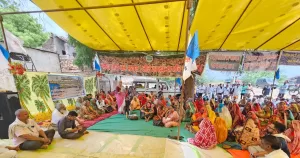The eviction in March of tribal people living in the foothills of Manipur from their traditional forest lands on the grounds that these are “reserve forests” and the conflagration that soon ensued may have more to it than meets the eye. Critics say these are a prelude to a “land grab” in the name of development in India’s sensitive north-eastern border region. Several factors point to this, including the introduction of a Forest Bill in Parliament in March and a number of proposed “development” programmes, such as the push for palm oil plantations in biodiversity hotspots and monoculture cash crops in traditional shifting cultivation (jhum) lands. These measures will have far-reaching consequences for constitutionally protected rights of tribal communities over land and resources in the region.
The Forest Conservation (Amendment) Bill, 2023, introduced in the Lok Sabha on March 29 to amend the Forest Conservation Act, 1980, (FCA), was forwarded to a Joint Committee of Parliament, which is exclusively made up of Bharatiya Janata Party (BJP) MPs, while bypassing a Parliamentary Standing Committee. A notification issued by the committee gave the public 15 days (before May 18) to respond. The committee is expected to submit its report in the upcoming monsoon session of Parliament.
The Bill states that the FCA “needs amendments because they present a challenge to ecological, social and environmental development” and seeks large-scale conversion of forest land into non-forestry use, while providing easy access to private corporations.
Communities in the north-eastern region say the Bill does not take into account their indigenous rights to the land and its resources or has exempted their land from its purview.
The Bill gives blanket exemptions to the existing stringent provisions of the FCA. For instance, land situated within 100 km along the international borders, the Line of Control, or the Line of Actual Control is proposed to be used for “construction of strategic linear projects of national importance and concerning national security”.
This implies a significant diversion of forest land in the untouched areas of the Eastern Himalaya that is rich in biodiversity and natural resources.
The north-eastern States have borders with Bangladesh, Bhutan, Myanmar, Tibet, and China. The Bill is likely to impact virtually 90 per cent of Nagaland’s territory, which falls within the 100 km radius of the international border; large parts of Arunachal and Assam; and the entire area of Meghalaya, Mizoram, Manipur, and Tripura.
The FCA has thus far protected vast swathes of land owned by tribal communities or private individuals (described as unclassified forests) in the north-eastern region. A 1996 Supreme Court judgment in the landmark Godavarman case states that the conservation of forests and matters connected therewith must apply to all forests irrespective of the nature of ownership or classification.
The Bill seeks to remove checks and balances with regard to forest areas along the 15,000 km of international border in the Himalayan region, in the north-eastern States, Andaman and Nicobar islands, and the Western Ghats. Paramilitary forces have the right to clear up to 10 hectares in areas affected by left-wing extremism in central India, which violates the laws ensuring forest dwellers’ rights.
The Bill also indicates that forest areas can be leased to the private sector for eco-tourism, zoos, and safaris. This is in keeping with the BJP’s resource-extractive model that seeks to build a $5 trillion economy by 2024, with forests reduced to a commodity.
Communities in the north-eastern region will need time to unravel this ambiguously worded Bill and understand how it applies to their separate State laws.
Meanwhile, in a bid to gauge public reaction, the BJP governments at the Centre and in Manipur went ahead with plans to evict the Kuki-Zo groups from their community lands, claiming that they were illegal migrants from Myanmar and poppy cultivators encroaching on reserve forests. The Kuki protests and the “ethnic cleansing” that followed were given a communal colour. While the Manipur government struggles with the issue, the Centre has begun to dismantle the special constitutional protections of the north-eastern tribes.
Constitutional safeguards
The north-eastern tribal areas are today, in varying measure, the only places in India with the strongest constitutional safeguards. Provisions of the Sixth Schedule and the Article 371 series protect community ownership of land and natural resources, administration, and cultural practices. The Sixth Schedule, which provides for administration through Autonomous District Councils, applies to Assam, Tripura, Meghalaya, and Mizoram.
Even though Meghalaya and Mizoram have attained statehood, the tribal people under Autonomous District Councils can frame laws on land, public health, agriculture, and other aspects of administration. Arunachal Pradesh, Manipur’s hill tribes, and Ladakh have requested Sixth Schedule status.
Despite falling within the ambit of Article 371, Arunachal Pradesh and Manipur have the least level of protection among the north-eastern States. In Arunachal, the Centre has a strong hand in all decisions through the Governor, who can override the State Assembly.
Arunachal is covered by Article 371H of the Constitution and is subject to laws under the Forest Act, Inner Line Permit, and panchayati raj. Many tribes/communities claim ancestral rights over these forests. In 2020, the BJP government in the State demanded Sixth Schedule status and the strengthening of the provisions of Article 371H, but these were not met. People, having witnessed and experienced large-scale displacement from massive dam projects, realise that existing laws give the State government no control over their land and resources.
Similarly, Manipur is covered under Article 371C with respect to its culture, land rights, and administration. The hill areas dominated by the tribal Naga and Kuki-Zomi-Hmar communities come under Autonomous District Councils, a parallel to the panchayati raj system created in 1973, but there has been no meaningful devolution of power by the Meitei, who dominate the State administration (irrespective of which party is in power).
The Meitei form around 54 per cent of Manipur’s population, control 40 of the 60 seats in the Assembly, and hold the purse strings for development and administration of the hill tribes. Since the communal riots in May, the tribal demand for Sixth Schedule status and a separate State has intensified.
Nagaland was granted special provision under Article 371A (an outcome of the 16 Point Agreement of 1960) after decades of guerilla war and bloodshed. Naga society is still deeply divided over the issue of an honourable settlement. The 1986 Mizo Accord granted Article 371G special provisions to Mizoram.
These safeguards allow the Nagaland and Mizoram Assemblies to make laws relating to land, resources, and political and cultural rights, even prevailing over Acts of Parliament. The Nagas say the main issue for them is whether the 2023 Forest Bill will undermine Article 371A or supersede it in any way.
“As the crow flies, more than 90 per cent of the total area of Nagaland will fall under the 100 km distance from the international boundaries. Consequently, the forest land under these areas can be used for developmental work in the name of national security,” said Gwasinlo Thomg, a Rengma Naga from Sendenyu village in Kohima district. “Most forests in the region, particularly in Nagaland, are still standing not because of government rules or Acts but because the indigenous communities preserve them. Any attempt to disturb them will endanger the very existence of these community forest lands. The government should consult the stakeholders and civil societies. How can we let a committee with members from Bihar, Uttar Pradesh, or Madhya Pradesh decide what they do with our forests?”
Promoting palm oil plantations
Meanwhile, a massive push to promote palm oil plantations in this hotspot of biodiversity is under way. Backed by unprecedented government subsidies, distribution of free saplings, promises of infrastructure development, and access to markets, several north-eastern States have signed MOUs with corporate groups such as Patanjali and Godrej Agrovet and are converting agricultural and forest lands into monoculture, cash-crop plantations.
Significantly, many communities are unaware of the downside of such plantations and the threat to food security. Mizoram’s adoption of monoculture palm oil plantations since 2004 has had disastrous consequences. Water is acutely scarce and these plantations are water guzzlers, besides needing chemical inputs. Farmers report loss of soil fertility, destruction of biodiversity, and zero profits. Many have been compelled to sell their lands (see box).
The situation is similar in Peren district of Nagaland, where palm oil cultivation started in 2015, said the environmentalist Bano Haralu. The chairman of Nkio B Village told her the government assured them of good returns, that their plants would grow up to 100 feet, and they would be able to harvest the nuts for four months a year. However, the promises of infrastructure and collection centres never materialised. One farmer said he cleared two hectares of his forest land to plant over 300 free saplings. Eight years later, he is yet to get a single rupee in returns. Nobody warned him about the thick undergrowth in palm oil growing areas. Twenty labourers need to clear it four times a year. This year, he said, he would not make the effort and would be happy even if the trees died.
Evidence from countries such as Indonesia and Papua New Guinea shows that monoculture palm oil crops are a disaster, leaving impoverished communities and unaccountable corporates with a trail of broken promises. It has destroyed soil fertility and biodiversity, undermined local food security, and tribal sovereignty.
Once proud landowning tribal communities have ended up as plantation labour. And it has resulted in a corporate “land grab”.
Eager to show growth in the economy and standard of living, the “double engine” BJP governments in the north-eastern region have heedlessly pushed palm oil cultivation, despite overwhelming evidence against its introduction in biodiversity rich areas. The government and its agencies are also conducting a systematic campaign against shifting or jhum cultivation, terming it unscientific and blaming it for loss of forest cover.
In the name of ‘development’
Branded as “wasteland”, jhum fields, in fact, provide tribal communities with a range of food and non-food crops like timber, bamboo, and medicinal plants. Many north-eastern tribes have practised jhum cultivation in a scientific manner. They see the plan to replace jhum with mono plantations as yet another assault on tribal lands and autonomy in the name of “development”.
Armed with the means to legally take over tribal forest lands, a plan to lure unsuspecting communities into destructive monoculture plantations, and making an effort to embroil neighbours in hate campaigns, the BJP governments in the north-eastern States are ensuring the dismantling of some hard-won constitutional safeguards of the tribal people.
For generations, these communities have safeguarded India’s water sources, food biodiversity, medicinal plants, and wildlife by protecting the forests. These have acted as a crucial buffer against the impact of climate change and the resultant increase in the frequency of cyclones, floods, and droughts. All that might change now.
(Rupa Chinai is a Mumbai-based independent journalist who writes on public health and development issues. She is the author of ‘Understanding India’s Northeast: A Reporter’s Journal’. Courtesy: Frontline magazine.)




